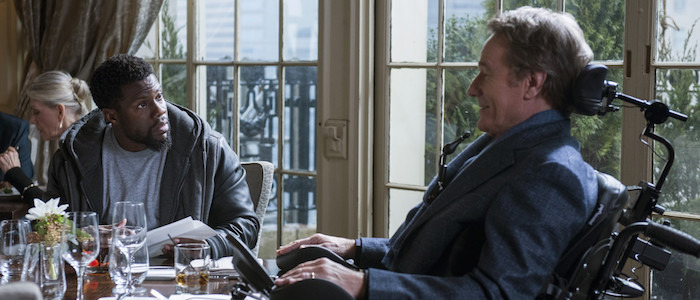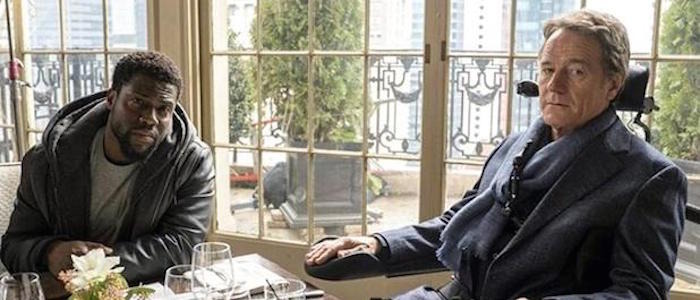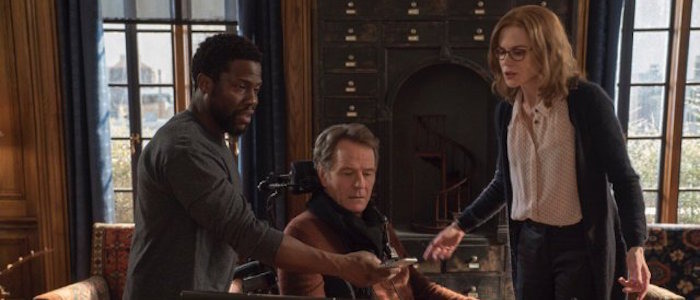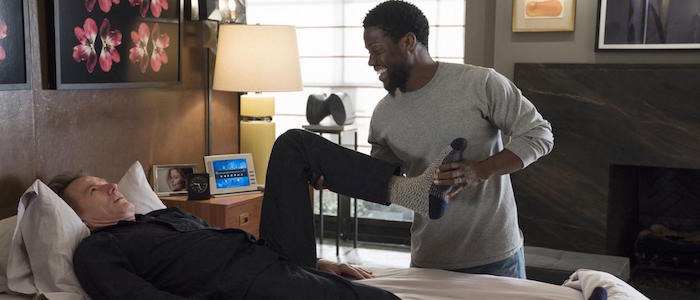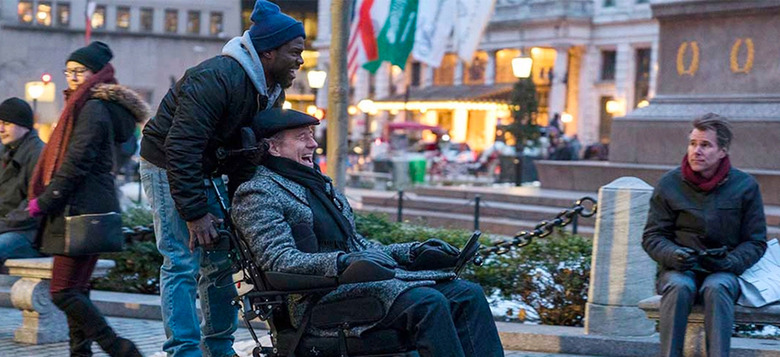The Upside And The Downside Of 'The Upside': An Analysis From A Disabled Writer
Putting it bluntly, it's difficult to get excited anytime Hollywood wants to trot out a narrative on disabilities nowadays, especially as someone born and living with Muscular Dystrophy Type 2. They are stubbornly set on staying the feel-good course without necessarily saying anything meaningful or relevant. If you thought Green Book had nothing but safe and obvious observations, tackling race relations with the force of bopping someone on the head with your finger, well, the disabled community doesn't currently have any better stories with movies like The Upside.
In Defense of Bryan Cranston
Before The Upside even screened for most markets, Bryan Cranston had been making media rounds and found himself somewhat under fire for taking the role of a quadriplegic in the first place, to which he responded by giving the justifiable defense that actors are meant to embody many different characters, often ones different from themselves (it wasn't specifically stated, but the reasons are likely for personal fulfillment, accepting a challenge, or paying the bills). He also likened the casting to a business decision, which, set aside your outrage and face the music, makes sense for a medium-sized production requiring charismatic actors to lure in audiences.
Sure, I would love to see a disabled person in Bryan Cranston's role of real-life figure Phillip Lacasse, but there are also numerous variables and evidence suggesting that it's not always a wise strategy in terms of quality; for every The Rider (Chloe Zhao's beautiful film containing a hauntingly paralyzed and speechless performance from Lane Scott that I instantly pegged as more real-life than straight-up acting, coming into the movie blind) there are disasters like Clint Eastwood's The 15:17 to Paris, which saw real able-bodied veterans reenacting an action-packed moment of heroism. There is the argument to be made that such non-trained disabled actors have not been given a chance to show off their potentially untapped acting chops, which is fair, but it's also logical to look the way of an incredibly respected talent like Bryan Cranston and give him the role, knowing that he's going to take it seriously and put in the effort.
Also, and this especially goes for disabled people, privileged rich actors willing to step into our shoes and experience what are often straining and difficult lives firsthand, deserve respect and not anger. Extreme cases such as Daniel Day-Lewis and his performance as Christy Brown in My Left Foot saw the method performer reportedly never leaving character throughout filming, going as far as having individuals feed him, while also breaking two of his ribs ensuring he got certain details right. That's not to deny that these roles are being taken away from the disabled community, but what good does loathing and lashing out at people trying to better understand harsher conditions in a lived-in manner accomplish?
The real problem is that there are some movies containing disabled characters in the background, supporting players that don't require much acting experience or impact the movie as a whole, and those are roles that disabled performers should receive without question. From there, we can work towards getting one a major role, but for now let's try not to throw shade at celebrities for stepping into uncomfortable shoes when they could easily take some other cash-grab, truly undemanding and terrible project and collect a check without breaking a sweat.
With that said, Bryan Cranston doesn't do anything revolutionary in the role and certainly won't win any awards like Daniel Day-Lewis did, but it should be admired that he is out there driving a motorized wheelchair operated by stroking his chin up against a joystick mechanism, and inserting what feel like off-the-cuff remarks on doorway bumps that Kevin Hart accidentally doesn't notice. There is no denying the performance wasn't phoned in, but as for authenticity...
The Laws of Physics Do Not Apply to the Physically Disabled
It wouldn't be wrong to fault a physically disabled individual for wanting to flee the theater upon The Upside's opening scene, which sees Kevin Hart's caretaker Dell and Bryan Cranston's Phillip, without context, in a nighttime joyride that turns into a high-speed police chase. Here, we have a man only retaining movement of his neck following a disastrous parachuting incident, someone who immediately nearly falls out of his wheelchair during Kevin Hart's first day on the job after transferring him from there from his bed and forgetting to strap him in, who somehow is fine throughout what could stand in for a deleted scene of the Fast and the Furious. I've ridden in the back seat of cars before provided my wheelchair accessible van was not an option, and it's not a fun experience falling left and right in response to the gentlest of vehicle turns. Let's just say it's ugly to imagine what would happen to an actual disabled person riding along in the passenger seat at high speeds.
Similar logic is abandoned during a brief conversation aboard a bus or train (I couldn't really tell which it was, but that's also not the point). Regardless of which of these modes of transportation it actually was, it's a stretch to believe that a wheelchair, especially one as surprisingly basic and technologically free for a rich businessman (seriously, I'm an average person and even mine has superfluous but fun features letting me know my total distance traveled, along with some rather important functions like speed settings and multiple speed modes), would not slide or rock up and down during the short journey. Even if there was equipment to lock into the wheelchair and maintain it in place, there's no reason not to pan the shot further back so viewers could see the safety measures applied. The littlest details go a long way both in adding and breaking immersion.
That's all just a warm-up to the climax, where a quadriplegic man goes parachuting. Yeah... I suppose it looks relatively safe but the man could still feel his neck, so it has to be painful on some level. Allowing a disabled man to go parachuting also seems like a pretty big liability that almost no one would sign off on; that would be like me trying to ride a roller coaster at Six Flags, which considering everything else in this movie, I'm surprised is not an actual scene here between Dell and Phillip. Fortunately, things remain rather grounded on landed in the wheelchair, especially during...
Online Dating, Three Times as Frustrating for the Disabled
Okay, so technically Phillip is not actually searching for women in the online hellscape, but halfway through The Upside it is revealed that he has a penpal. He writes loving letters by dictating them to his assistant (Nicole Kidman in a rather thankless role, but I'll leave that assessment for reviews of the film) which, I presume, are then mailed out. The fascinating aspect of this companionship is that neither of the two is aware of what each other look like, and have agreed to keep things that way. In a not-so-subtle but nice touch nonetheless, Philip copies other poems for his letters despite having an intelligent mind, fitting with his apparent nervousness and inability to accept and be his new self in front of new flames.
Naturally, as the film goes on, things become more serious and the two eventually meet on a date, and while I don't want to outright spoil what happens, this is by far the best scene in the film; it's grounded in real human emotion, complex thoughts, and provides empathy for both characters in the situation. If any meaningful conversation comes from The Upside, it will be from the fear and intimidation that understandably comes with becoming romantically closer to a person with almost no mobility, regardless of gender. For clarification, I don't mean sexually. This is about the act of simply getting closer to someone disabled and how hard that can be for someone able-bodied; it's not an easy choice to willingly make.
Disabled viewers searching for anything relatable to cling onto and give the film credit for will find it here; I personally have been given the soft rejection speech multiple times over, cited complications of being with someone disabled and the lack of physical attraction that can come with that. While it's wrong to outright label someone shallow for turning the disabled away romantically (although I'm fully aware these people also exist), there needs to be a dialogue regarding the challenges of dating someone disabled that gives people the push they need to take a chance on them. Not to be cheesy, but love can come from the most unexpected of places (I promise that statement is more truthful and less nauseating than the actual eye-rolling ending to the film).
The Spectacular Bromance of Kevin Hart and Bryan Cranston
It should be evident by now that The Upside is a mixed bag that doesn't really do anything highly offensive to the disabled community (there's nothing like that garbage emotionally manipulating and nonsensical ending from Me Before You here), and that's mostly because the writing and direction are honed in on the camaraderie and charisma of these two talents. Do I wish the film took a more serious approach to disabled caregiving rather than comedic bits of Philip claiming that the inept shower he's receiving is more like waterboarding or Dell jokingly giving his client a Hitler mustache while shaving off his depression beard? Absolutely, but at the same time I will admit that the film surprisingly works for what it is trying to be. There's also the fact that the emotional swerves actually land.
One sequence in particular sees Dell assisting in releasing pent-up anger and frustration by breaking a number of valuable objects around and for Phillip; if there's anything true in life, it's that breaking shit cures the soul. This comes moments after Philip flies off the handle, verbally insulting people for throwing him a surprise birthday party, to which Dell responds by giving him a much-needed reality check. However, the reason that the scene plays so strong is that, from my experience, disabled people, especially if they are born with their disabilities, do have a penchant for unfortunately taking out their frustrations verbally on those that don't deserve it, and we know those people don't deserve it, but we do it anyway because occasionally elements of our lives become overburdening to a suffocating degree. Essentially, it's a subconscious impulse that we have to fight, some more often than others, even if most of the time we are calm and collected. In a film filled with feel-good moments, this is another one of those far and few between scenes that feels lifted from reality. The problem is that there aren't enough of them.
The Disabled Community Deserves More Than a Bromance
With that said, enough with the feel-good disability stories. If The Upside is our community's Green Book for the modern era, then hopefully someone out there is willing to challenge themselves and give us something on the level of BlacKkKlansman for the disabled. At this point, I don't care if the protagonist is played by someone able-bodied or disabled. The remarkably acted and directed Stronger was a step in the right direction, but it's been *checks watch* never since there's been an American love story between able-bodied and disabled persons told with raw honesty unafraid to unflinchingly hold back on everything from the challenges of such a relationship, exploring everything from initially bonding to sharing hobbies to caregiving all the way to sexual adventures. As someone who prefers cinema at its most relentless and real, that's the movie I want to see one day, and not just as a disabled person, but as someone who wants the cinematic arts to better inform and teach the able-bodied.
Why? Well, it's obvious very few individuals are brave enough to go experience such a relationship dynamic for themselves. Even this feel-good slice of Hollywood sentimentality knows it.

